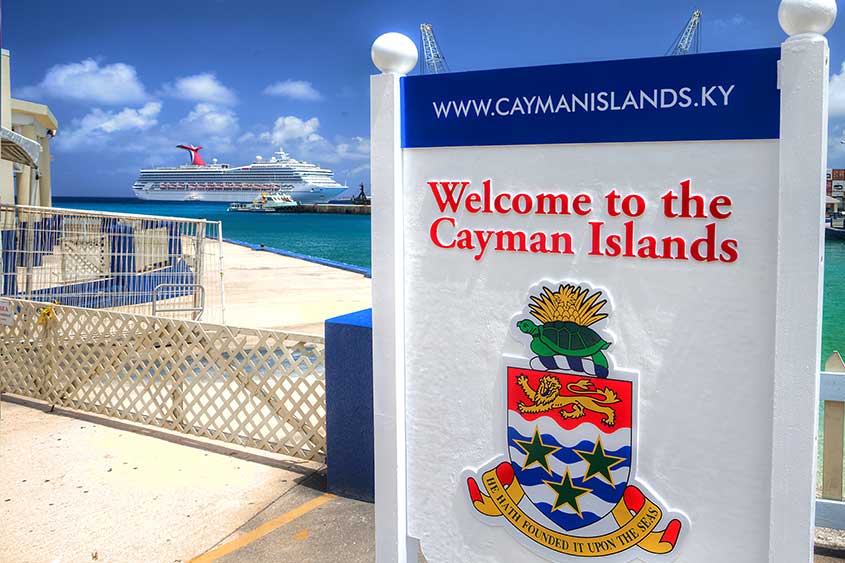How to Open an Offshore Bank Account in the Cayman Islands
You do not have to be a resident or to have even visited the Caribbean to open a Cayman Islands bank account. There are many benefits of holding a Cayman Islands bank account, however. Read on to find out how to open a bank account in the Cayman Islands, why you might do so and which banking establishments provide services to overseas investors.
We are the leading asset protection boutique law firm in Switzerland with a proven track record.
- Holding a Cayman Bank Account – A Brief Overview
- Your Step-By-Step Guide to Opening a Cayman Islands Bank Account
- The Advantages of Cayman Islands Offshore Banking
- Interest Rates Offered By Cayman Islands Banks
- What Is the Minimum Investment You Need When Setting Up a Bank Account in the Cayman Islands?
- Your Cayman Island Banks List
- Frequently Asked Questions About Holding a Cayman Islands Offshore Account
[1.] Holding a Cayman Bank Account – A Brief Overview
Firstly, the Cayman Islands are officially designated as an autonomous British Overseas Territory. Three islands make up this territory which has long been associated with its tourism and banking industries. In fact, it is widely regarded as one of the world’s leading financial investment centres. Lots of the globe’s foremost banks have branches there.
As such, setting up a bank account in the Cayman Islands can suit both private individuals as well as businesses. That said, the Cayman Islands offshore banking industry is subject to some controls. Although banking privacy is high in the territory, there are anti-money laundering measures in place, for example. These were brought in following the Mutual Legal Assistance Treaty of 1986, a deal struck with the United States which now means some more customer record keeping is in place.
Nowadays, Cayman Island banks could not be accurately described as offering tax havens. However, they remain an attractive place to store wealth. Read on to find out why so many people want a Cayman Islands private bank account or an investment fund account there today.
[2.] Your Step-By-Step Guide to Opening a Cayman Islands Bank Account
To begin with, it is important for anyone setting up a bank account in the Cayman Islands to understand their own country’s rules before doing so. Some Cayman Islands offshore banking establishments are on the European Union’s blacklist of foreign tax havens, for example. This does not prevent overseas investors from opening a Cayman Islands offshore account but it could lead to further scrutiny of their finances. Deliberately trying to hide wealth in a Cayman Islands bank account may land you in legal trouble but opening one does not mean you are necessarily trying to avoid taxation at home.
Secondly, check out some of the Cayman bank account providers online. You do not need to travel to the territory in person to open a bank account in the Cayman Islands. Sometimes, all you need to do is apply online. That said, many investors will prefer to at least organise a video conference or telephone call with their chosen establishment before transferring funds. After all, as well as storing your wealth securely, you may also want to discuss the availability of other financial services, such as internet banking, credit cards and investments before proceeding.
Thirdly, decide whether you want a Cayman Islands bank account to hold your wealth for you for a time or whether you want an investment account. A Cayman bank account that is managed for you may offer a range of investment products, such as stocks, mutual funds and bonds. These are commonly associated with higher professional fees than conventional Cayman Islands offshore banking accounts. However, they can provide a significantly greater return when they are administered well.
Next, look into all of the charges that might apply. Those which have the highest fees can sometimes outperform cheaper alternatives but this is not always the case. When deciding which Cayman Island banks might be right for your attitude to risk, always look at the establishment’s past performance as an indicator of what you can expect in the future. Sometimes more than one Cayman Islands bank will have very similar services and performance history but charge different amounts so, as usual, it pays to shop around.
Check whether the Cayman bank account you are considering opening means you have to obtain an apostille stamp. This is a stamp issued by a government official which may mean you have to show your application form to the authorities in your home state. For example, in the UK, the fee for an apostille stamp is only £30 and you can apply for it online. However, not all Cayman Island banks will require you to obtain one.
It is also worth finding out what other documents you may need to produced to open a bank account in the Cayman Islands. Typically, you will need some proof of ID, a previous financial statement and a declaration of the use you expect to put your wealth to. Not all Cayman Islands private bank accounts have the same level of scrutiny, however. Choosing a Cayman bank account where there are fewer checks may mean the tax authorities at home take a greater interest in your reasons. Therefore, the more information you provide, the fewer questions there tend to be.
Finally, it is time to proceed with your application. Depending on the amount of information you need to supply, setting up a bank account in the Cayman Islands can be done in just a day or two. Once opened, you can begin to start enjoying the benefits of your Cayman bank account. Discover what they are in the next chapter.
[3.] The Advantages of Cayman Islands Offshore Banking
One of the main reasons that people use Cayman Island banks is to benefit from the low local tax regime. Because the territory does not tax its banking establishments as highly as other territories around the world, it is a competitive place to run banks from. Sometimes no local taxes at all are applied to the interest you may earn in a Cayman Islands bank account. This is a perfectly legal practice and should not be mixed up with the idea of opening an overseas bank account to avoid tax where you live.
Another benefit of a Cayman Islands bank account is that it will be run in an internationally respected manner. Not all former tax havens have the same reputation for professionalism and fair dealing as those in the Cayman Islands. Many of the banking professionals who work in establishments there have training and experience at some of the world’s most prestigious financial centres. Much of the legal system that the banks there work to is based on English common law, one that is respected around the world as a sound basis for dispute settlement.
In addition, opening a Cayman Islands bank account is now no longer widely viewed as a tax-dodging method. Although some people obviously treat it that way, the increasing regulatory controls in the territory mean that it is simply another location in the world that provides high-quality banking services, albeit within a low-tax regime.
Finally, it is worth mentioning that a chief benefit of a Cayman Islands bank account is that it can mean your assets are protected from potential lawsuits. When legal settlements are made – perhaps following a divorce or a business transaction – which result in payments from one party to another, assets held in overseas private banking establishments are usually not considered as a part of the final determination.
[4.] Interest Rates Offered By Cayman Islands Banks
Generally speaking, a Cayman Islands private bank account will offer a good level of return for your investment. With so many establishments on just three small islands, there is a high level of competition among the banks there. However, interest rates vary from bank to bank and from account type to account type. Investment fund accounts can offer the greatest level of return but these managed accounts tend to have the highest management fees. They can also be more volatile.
For the general investor, the best interest rates are associated with Cayman Island bank accounts which restrict access. Typically, this means stowing your money away for between three and five years or paying a penalty to get at your money at an earlier stage.
[5.] What Is the Minimum Investment You Need When Setting Up a Bank Account in the Cayman Islands?
Like interest rates, the minimum deposit rules for Cayman Islands bank accounts vary. Residents in the territory will typically need only 80 Cayman Island Dollars (KYD) to open a bank account which is about $100 (USD). For overseas investors, setting up a bank account in the Cayman Islands only begins to be worth it if they have several thousand USD to invest.
A few banks will open an account for foreigners for as little as $1,000 which is about £780 or €900. Others will expect sums as high as $300,000 before they will consider opening an account. Given that charges of around $750 may be applied to open a Cayman Island bank account, it is easy to understand why the minimum deposit is so high.
[6.] Your Cayman Island Banks List
In recent times, around 100 Cayman Islands Banks have closed. Therefore, it is always worth checking which banking establishments still retain a presence in the territory before making an application for an account. The following Cayman Islands bank list is by no means exhaustive but it should give you a good idea of the sort of banks operating from the territory and the sort of services they provide.
Cayman Islands Banks Catering For Domestic and Oversea Clients
- Butterfield Bank (Cayman) Limited
- Cainvest Bank and Trust Limited
- Cayman National Bank Limited
- CIBC Bank and Trust Company (Cayman) Limited
- Fidelity Bank (Cayman) Limited
- FirstCaribbean International Bank (Cayman) Limited
- MUFG Alternative Fund Services (Cayman) Limited
- RBC Royal Bank (Cayman) Limited
- Scotiabank & Trust (Cayman) Ltd
Establishments Providing Banking and Trustee Services on the Cayman Islands
- Altajir Bank
- Atlantic Security Bank
- Banco BTG Pactual S.A.
- Bank of America, National Association
- Barclays Bank PLC
- BNP Paribas Bank and Trust Cayman Limited
- Canadian Imperial Bank of Commerce
- Credit Suisse AG
- Delta Bank and Trust Company, Grand Cayman
- Hinduja Bank & Trust (Cayman) Limited
- Merrill Lynch Bank and Trust Company (Cayman) Limited
- Northern Trust Company
- Sumitomo Mitsui Trust Bank (USA) Limited
- US Bank National Association
- UBS AG
Cayman Island Banks Serving International Clients Only
- American Express National Bank
- Australia and New Zealand Banking Group Limited
- Bank of China Limited
- Bank of India
- CIBC Cayman Bank Limited
- Credit Industriel ET Commercial
- Deutsche Bank Aktiengesellschaft
- National Australia Bank Limited
- Royal Bank of Canada
- Sackville Bank and Trust Company Limited
- Santander Bank
- Skandinaviska Enskilda Banken
- Societe Generale
- The Bank of Nova Scotia
- Webster Bank, National Association
[7.] Frequently Asked Questions About Holding a Cayman Islands Offshore Account
Quickly find out what you need to know about holding a Cayman Islands bank account by reading the FAQs, below:
Is holding a Cayman Islands private bank account legal?
Yes, it is so long as it is used only for legal purposes – just like any other type of account.
How can you withdraw money from a Cayman Islands bank account?
This will depend on the type of account you have chosen. Most Cayman Island banks provide a straightforward debit card but charges may apply for using it.
Which currencies do Cayman Island banks cater for?
As well as the local Cayman Island dollar, banks in the territory will hold sums in US dollars, Canadian dollars, Euros and British pounds.
How can you be sure a Cayman Island bank is reputable?
Look out for its banking licence. Plenty of establishments on the islands hold category A banking licences.
Who needs to be identified for a corporate Cayman Islands bank account?
Business owners who open a bank account in the Cayman Islands will usually have to declare themselves. Other directors and business signatories will also need to supply documentation about themselves. This will also apply to any shareholders who own ten per cent, or more, of the enterprise.




